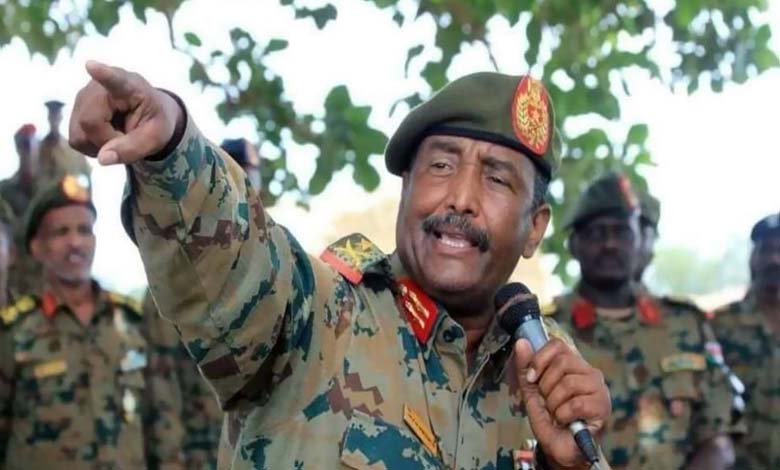Al-Burhan’s Desire to Step Down Reveals the Army’s Desperation to Win the Battle
Yasser Al-Atta claims to form a strategic alliance in favor of Sudan with major powers within and outside the region, as military supplies reach the army.

Yasser Al-Atta, assistant to the commander-in-chief of the Sudanese army, revealed the desire of the Chairman of the Sovereign Council, Abdel Fattah al-Burhan, to “step down” and hand over his military position to his deputy, Shams al-Din Kabbashi, implicitly indicating his despair over making progress in the battles as the war continues without an end in sight, and his inability to achieve the victory that army leaders promote at every opportunity, which evidence shows is nothing more than political propaganda.
Al-Atta made a series of controversial statements during an interview with Sudanese state television, saying that al-Burhan “told me that I have reached my limit and that they should agree to hand over power to Kabbashi. I told him to step down after the defeat of the Janjaweed.”
He added that if the Chairman of the Sovereign Council and army commander, Abdel Fattah al-Burhan, or his deputy in the army, Shams al-Din Kabbashi, or other aides were killed, “the armed forces have a million leaders, all of whom are al-Burhan, Kabbashi, and Yasser al-Atta,” in response to the assassination attempt on al-Burhan on Wednesday.
The General Command of the Sudanese Armed Forces announced that its ground defenses intercepted two hostile drones last Wednesday targeting the celebration site for graduates of military, air, and naval academies in the Red Sea State, northeast Sudan. The office of the armed forces’ spokesperson stated in a statement: “The incident resulted in the martyrdom of five people and minor injuries that are being counted.”
Rapid Support Forces advisor, Al-Basha Tabiq, commented on Al-Atta’s statements on platform X, saying they “confirm the state of frustration and despair that al-Burhan is experiencing after the defeats of the army, terrorist groups, and mercenary movements, and his inability to achieve any victory over the Rapid Support Forces.” He added that they indicate a “deep rift between Al-Atta and Kabbashi, and that the actual controller of the army’s decision is Al-Atta, supported by the Islamic movement led by Ali Karti.”
Observers of the Sudanese dossier believe that Al-Atta expresses the positions of the Sudanese Islamic movement and the Muslim Brotherhood, not the people. The Islamic movement bets on Al-Atta as one of its tools to return to power, and he is trusted more by them than al-Burhan.
The presence of Al-Atta in the Omdurman region, where elements of the Islamic movement and the former regime are located, and the Al-Bara bin Malik brigade influences his speech, which seems aligned with them. He supports arming the popular resistance, which Kabbashi disapproves of, confirming that Al-Atta expresses the positions of the former regime, not the Sudanese.
Al-Atta added in his statements that a strategic alliance is forming in favor of Sudan with major powers within and outside the region after regional forces tried to isolate and blockade Sudan.
He claimed that the upcoming period would witness decisive victories for the army on all battlefronts after recently receiving significant military supplies, with expectations of receiving more high-quality weapons that “will be the beginning of the end of the Rapid Support Forces.” He did not disclose the source of these weapons, but reports indicated that Iran had recently supplied various weapons to the Sudanese army as part of a strategy to pave the way for an Iranian naval presence on the Red Sea coast.
Al-Basha Tabiq commented on these remarks on platform X, stating, “If Al-Atta’s statements are true, it confirms the arrival of the Iranian ship carrying weapons and ammunition for the terrorist groups fighting the Sudanese people. In any case, the brave fighters of the Rapid Support Forces are waiting for these weapons to seize them from these terrorist groups and arm themselves.”
Analysts believe that Iran seeks to establish a foothold in the region and that if it obtains geostrategic concessions, it will provide more drones.
In October 2023, Sudan and Iran restored diplomatic relations, which had been severed in 2016. Since then, Iranian military planes have begun arriving in Port Sudan, and Iranian drones have started targeting Rapid Support Forces fighters.
The presence of a naval base in Sudan would place the Iranian army in the middle of one of the world’s busiest maritime corridors, and allowing Iran to establish a base would open the door for other countries to attack Sudanese territory, while Russia also pressures for a naval presence on the Red Sea.
Al-Atta’s announcement comes as attention turns to the Geneva talks aimed at ending the war in the country. It also precedes the Sudanese army‘s response to the US call for both sides of the conflict in Sudan to start a new round of talks beginning on August 14 in Switzerland.
Analysts consider this as evidence of disagreements within the Sudanese army camp regarding the negotiation process.
-
The Sudanese War orchestrated by the Muslim Brotherhood… Their Main Tools and Objectives?
-
Sudan: Al-Burhan Rejects Dialogue Initiatives
Al-Atta often disregards the military situation on the ground, the expansion of the Rapid Support Forces‘ control over significant military sites, and the increase in their presence and control over states and cities while besieging others and cutting off land routes between the center, west, south, and north of the country. He makes statements and threatens to defeat the “Janjaweed,” whose control area continues to expand without success.












